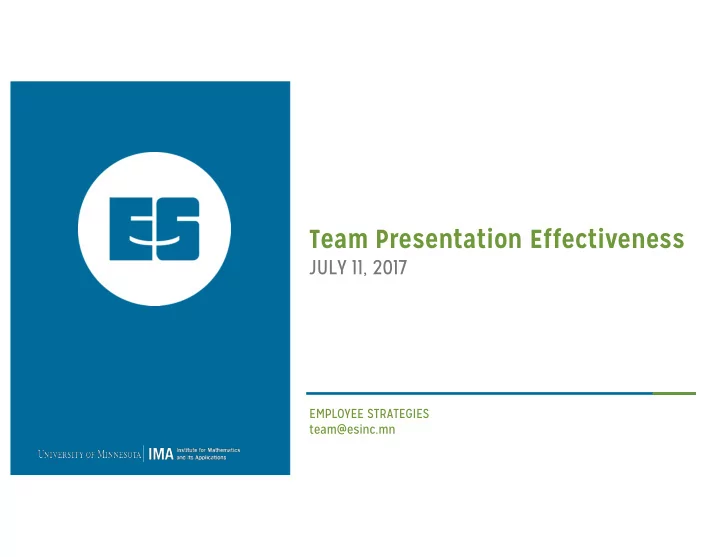

Team Presentation Effectiveness JULY 11, 2017 EMPLOYEE STRATEGIES team@esinc.mn
Welcome!
Objectives 1. Understand and practice the basics of effective presentations 2. Practice giving and receiving feedback
Agenda 1. Effective Presentations Overview 2. Feedback Framework 3. Presentations! 4. So What?
OUR GROUND RULES 1. There are no bad ideas. Ground Rules Check In 2. Communicate progress and failure. 3. Commit to being actively inclusive. 4. Take short breaks for team building. 5. Build a collaborative environment. 6. Limit online distractions. 7. Value all contribution levels. 8. Foster a judgment-free environment. 9. Show up on time and be present. 10. Give honest and constructive feedback. 11. Listen to understand. 12. Have fun! 13. Commend and encourage being wrong.
Effective Presentations
Why are presentations hard?
The Framework Tell them what Tell them what you’re going to Tell them. you told them. tell them.
The Process WHY? 1. Define the PURPOSE WHO? 2. Identify the AUDIENCE WHAT? 3. Outline your FEW KEY POINTS 4. Grab ATTENTION HOW? 5. Clarify the “So What?”
STEP 1: Define the Purpose pur·pose noun 1. the reason for which something is done or created or for which something exists.
STEP 2: Identify the Audience • How many? • Who are they? • What is important to them?
STEP 3: Outline Your Few Key Points
STEP 4: Select an Attention Grabber We’re about to embark on a journey that will change your life.
STEP 5: Clarify the “So What?”
Delivery • Some best practices • Plant your feet. Don’t pace. • Project. Fill the room with your voice. • Commit. If you don’t believe you, we won’t. • Stand if you can. • Rehearse it. Out loud. • Focus on transitions. • Tell me. Don’t read to me.
Feedback Framework
+ + Observation Impact Idea
• “When you…” • “I noticed...” • “I observed...” • Focuses on a behavior, not the person Observation • Fact-based, not opinion-based
You are gross. I noticed the dishes didn’t get done today.
• “….resulted in...” • “...caused...” • “I interepretted that...” • “The impact was...” Impact • States the outcome of the behavior • Impact may be real or perceived
You are an awful roommate. I’m really stressed because my parents are coming over tomorrow and the house is a mess.
• “You might try…” • “I would appreciate if...” • ”Have you thought of...” • Help think of other solutions Idea • Offer an effective alternative • Ask for something specific if needed
Do your dishes! Can you help me clean up? Could you do the dishes?
I noticed ________________. The impact was _______________. Impact Observation What if you tried _____________? Idea
THANK YOU! Employee Strategies, Inc. 2900 Thomas Ave S Minneapolis, MN 55416 team@esinc.mn
Recommend
More recommend